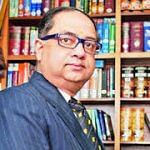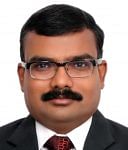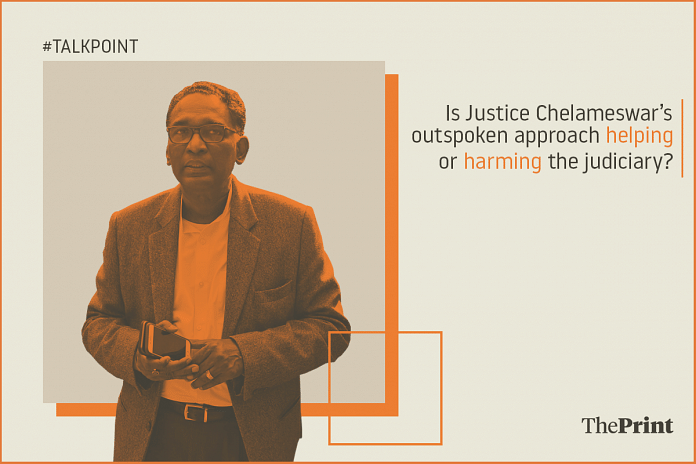At a recent event, Justice Jasti Chelameswar said that serving judges can talk to the media about issues relevant to the judiciary without violating guideline number 9 of the Judicial Code of Ethics.
He and three other judges had held a press conference in January to air their concerns about the need for transparency, accountability and independence of the Indian judiciary.
ThePrint asks: Is Justice Chelameswar’s outspoken approach helping or harming the judiciary?
Justice Chelameswar’s remarks may be forthright, but they are a symptom of a deeper institutional problem
 Alok Prasanna Kumar
Alok Prasanna Kumar
Senior Resident Fellow, Vidhi Centre for Legal Policy
The remarks of Justice Chelameswar, outspoken as he may seem to be, are also a symptom of a deeper institutional problem. One must keep it in mind that in the past, a sitting judge speaking out in public about problems within the judiciary has been a rare phenomenon and for good reason — the institution must not be seen to be a house divided against itself.
However, that doesn’t mean a false front of unity must be projected at all costs. Any robust judiciary has internal mechanisms where dissent can be aired and addressed openly. A successful chief justice (whether of the Supreme Court or at the high court level) is one who manages opposing views and opinions in a frank and open manner that inspires confidence among his brethren and sistren.
That we are seeing judges (not just Justice Chelameswar alone) come out in public and express unhappiness with the way the judiciary is being run suggests that either the internal mechanism of dealing with disagreements is not serving its purpose or that the manner in which it is being conducted does not inspire confidence among the judges. We have yet to see or hear of any concrete steps being taken by CJI Dipak Misra to address the institutional concerns raised by the judges in their press conference.
It’s foolhardy to believe that silence will, in any way, serve the judiciary or address the concerns being raised. Every day of inaction on this front from the CJI only erodes the credibility of the institution even further.
Justice Chelameswar’s remarks have resulted in an open spat between the judiciary and executive
 Mohan Parasaran
Mohan Parasaran
Senior advocate, Supreme Court and former Solicitor General of India
At the outset, let us make one thing very clear– judges are not supposed to talk to the press as per the memorandum of procedure governing their conduct while holding office. But in this case, they decided to go to the media. Whether what they did was right or wrong, I’m not going to comment upon and it’s a larger issue.
Now Justice Chelameswar has spoken out for the second time. I’m not questioning his motives. He might be acting in the larger interest of the institution. He is one of the outstanding judges.
However, some of his observations have resulted in the executive taking up cudgels with the judiciary and issuing a rejoinder. They have resulted in an open spat between the judiciary and the executive, possibly affecting the image of the entire institution.
Therefore, in my personal view, this was uncalled for. When you are occupying one of the highest judicial offices in the country, especially considering the advancement in technology, one should avoid going to the press. You never know how your views could be twisted.
Justice Chelameswar is still occupying the office, he is a sitting judge. What he has done is not a good precedent to set. Hypothetically speaking, reform can be ushered in from the inside as well. He has been part of the institution for so long now. Why has he spoken so late?
I’m concerned about the embarrassment that may be caused to both him and the judiciary. People inimically disposed towards him will try to take advantage of this. In the long run, such an approach doesn’t augur well.
Justice Chelameswar’s recent actions have only harmed the judiciary as an institution
 Raghav Pandey
Raghav Pandey
Senior Fellow, Department of Humanities and Social Sciences, IIT Bombay
The actions of Justice Chelameswar have of late only harmed the judiciary as an institution. The judiciary, unlike the other wings of the government, is an even more trust-based institution where the traditions and practices play as major role as a written law.
Justice Chelameswar has decided to act explicitly against the written letter of law by interacting with the media on such a regular basis and more so has violated the long held traditions of the court. The Supreme Court in 1997 had itself adopted an ethical code of conduct, ‘The Restatement of Values of Judicial Life’, which prohibits a judge from speaking to the press.
One can still attribute a benevolent intention to a single press conference. However, the problem is that it wasn’t backed by any action. The allegations against the CJI were very grave. I was expecting that these four judges would resign in protest, or at least Justice Chelameswar would, who didn’t have much time on the bench, before his retirement, if what they regarded as right wasn’t not happening in the court. That didn’t happen. Instead Justice Chelameswar is now regularly interacting with the media and has even met a politician, D. Raja from the CPI. These actions certainly don’t merit his office.
Coming to the issue he is addressing, if he feels that his biggest fear will come true if Justice Gogoi isn’t made CJI, then it begs the question: what is he doing about it? Why is he still serving in the court? Will he advise Justice Gogoi to resign too, in the event of him not being made the CJI?
The judiciary showed its mettle twice, when senior judges were superseded. Each time the seniors resigned from the court. I fail to understand why it isn’t the case this time.
The attempted politicisation of the judiciary is certainly detrimental to the long-term interests of the judiciary.
Instead of washing dirty laundry in public, it would have been better to follow institutional methods
 Virag Gupta
Virag Gupta
Advocate, Supreme Court
Justice Chelameswar’s hard talk in answer to veteran journalist and ‘devil’s advocate’ Karan Thapar could well harm the judiciary. The press conference he held with three other judges of the Supreme Court was a never-seen-before event in the Indian judiciary. However, he may be given credit for publishing minutes of collegium meetings and the interviews of candidates for judgeship. His declaration of not taking a post-retirement job is a fine example for other judges. Chelameswar’s dissenting judgment in the NJAC case is a benchmark as it highlights concerns over the opacity in the system.
It is interesting that seniority between Justice Chelameswar and Justice Dipak Misra has been a a swinging issue. Justice Chelameswar became a High Court judge after Justice Dipak Misra, but got Chief Justiceship of High Court before him. Both Justice Dipak Misra and Justice Chelameswar took oath as a Supreme Court judge on the same date, but Justice Dipak Misra became Justice Chelameswar’s senior as his name was further up in the list. In this scenario, it is also worth wondering whether we would have half the action if Chelameswar was the present Chief Justice of India. His comments on the prospects of Justice Gogoi becoming the next Chief Justice of India were also not warranted.
The problems in the collegium system are institutional, and the matter should not be marred by personal allegations. One does not know if, as high court chief justice, Chelameswar shared his work as ‘master of roster’ with other senior judges of the court. His intervention regarding the oppressive inquiry against a district judge did wonders. So why should he not take similar steps for other issues plaguing the judiciary? Instead of washing dirty laundry in public, it would have been better to follow institutional methods of asking for a full-court reference or meeting the President of India.
Keeping quiet doesn’t always help solve problems, you have to stick your neck out, like Justice Chelameswar has done
N.S. Boparai
Advocate, Punjab and Haryana High Court
What Justice Chelameswar has done is very brave.
We need to consider what circumstances prompted him to speak out his mind. He probably reached a threshold where he thought it was better to speak out, than not. Every system has to keep evolving consistently. The changes have to come from within. When all internal processes fail, only then you reach out for external intervention, like Justice Chelameswar has done.
Moreover, he is talking about accountability, transparency and independence of the judiciary. These are things that can help improve the judicial process. He is trying to change the system for the better.
It’s not like he is talking about judicial cases, he is addressing the flaws in the system to bring about improvement. There is nothing incorrect about that.
He has been a part of the system for a very long time. He is nearing retirement, and probably thought it was necessary for him to spell out the advances that the system requires. Justice Chelamsewar is not in this for personal gain. He is attempting to make a positive change that only benefits our judiciary and ultimately, our democracy.
Keeping quiet doesn’t always help solve problems. You have to stick your neck out if you think something is wrong. Justice Chelameswar going to the press is certainly a precedent that others who feel that there something ailing the system are at liberty to follow.
It’s not dangerous for Justice Chelameswar to speak, but the precedent he’s setting is
 Apurva Vishwanath
Apurva Vishwanath
Special Correspondent
Of course, judges have a right like any other citizen to express their views. But the answer to whether they should be doing it, and what issues they should be talking about, is a more complicated one. The question has been asked several times before, in India and in other jurisdictions. In 1955, the BBC had approached Lord Chancellor Kilmuir and a number of senior judges in the UK for interviews on former judges who had left behind a legacy. Kilmuir’s refusal came to be famously known as the Kilmuir rules. He said, “Every utterance which [a judge] makes in public, except in the course of the actual performance of his judicial duties, must necessarily bring him within the scope of criticism.”
In India, sitting judges have spoken when invited to deliver memorial lectures or to be on panels on legal issues. What’s unusual is them talking about matters of the court. This is the generally accepted position — keeping the judiciary insulated from the controversies of the world is necessary to protect the integrity of the institution.
That highly protected rule is set to be broken for the third time in as many months by Justice Chelameswar. Last week, he also defended his right to speak out in public on any issue that does not include his judgments. In the 90-minute conversation, Chelameswar strayed from his own stance. First, when he said he didn’t understand why the CJI felt it necessary to overrule his order in the medical college case. Then he spilled the beans on the disagreement in the collegium.
The dangerous thing is not that Chelameswar spoke, but the fact that this sets a precedent.
Compiled by Deeksha Bhardwaj, journalist at ThePrint.




Every other day some remark or comment by Justice Chelmeshwar is not in the interest of the institution ,as it will tempt the Govt .to interfere more in the Judiciary .He led the other Judges when they spoke first to the press.Thereafter other Judges have not said anything regarding issues raised ,but Justice Chelmeshwar is still speaking on the issues from time to time in various conferences etc, which he is attending for discussion on various topics from time to time . .He appears to be still not satisfied and happy with overulling of his order by CJI for constitution of Bench for hearing particular matter.Though it may not be correct ,but it appears from his talks that for some reasons he feels that he has missed the chance to be a CJI. While speaking to press on first occassion regarding impeachment ,the Honable Judge said that it is for people to decide,but recently when asked about impeachment ,he stated that impeachment is no solution .The other strange thing said by him is about fear of possibility of Justice Gogoi not being made the next CJI.It is not known why he had to say about this in answer to a question put by someone in the conference or otherwise ,as it was out of context and the purpose behind making this kind of statement is not clear.Though some new steps have been taken by Honable CJI regarding roster,fixing of matters before different Judges as per category of matters ,but still it appears that at least Justice Chelmeshwar is not happy with the move and still has a feeling that more important matters should have been posted before his bench.
Helped, greatly so. If appropriate actions are not taken, there will be more such mutinies.